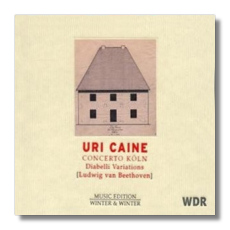
The Internet's Premier Classical Music Source
Related Links
- Caine Reviews
- Latest Reviews
- More Reviews
-
By Composer
-
Collections
DVD & Blu-ray
Books
Concert Reviews
Articles/Interviews
Software
Audio
Search Amazon
Recommended Links
Site News
 CD Review
CD Review
Uri Caine

Arrangements and improvisations on
33 Variations on a Waltz by Diabelli, Op. 120
by Ludwig van Beethoven
Uri Caine, piano
Concerto Köln
Winter & Winter 910086-2
If you think the notion of a Beethoven/Jazz crossover is obscene and sacrilegious, please do read on anyway!
I am coming round, with some reluctance, to the view that this decade, and the end of the last, might in the future be characterised as the ones in which "cross-over" matured, to the enrichment of western music and global appreciation of the vast potential to be drawn from alternative cultures - reluctantly, in that I am not comfortable with the cross-over craze which is infiltrating traditional Indian classical music.
So what about Beethoven and jazz?
Uri Caine shows his respect for the composer and the context of his late masterpiece at the outset with the brilliant notion of choosing for this collaboration a leading "authentic" period instrument orchestra, the Concerto Köln. And again by his daring choice of an 1839 Erard fortepiano for his own improvisations. But there is no "authentic" politeness about the playing of orchestra or piano; Caine pounds the Erard to its limits (I bet the tuner was kept busy!) just as the deaf Beethoven must have punished his instruments.
Some of Caine's orchestrations for Concerto Köln are so imaginative that you wonder why no-one had ever tried arranging it for orchestra before (or have they?). Uri Caine's affection for his source is evident throughout, and his embellishments, partly coming from the world of jazz, ought to cause no offence.
But alongside wild flights of the jazzman's imagination, there are variations of classical purity. Your misgivings may be quelled when you hear his perfectly poised Largo, molto espressivo Var. XXXI, highly decorated in the original, and here with the repeats further ornamented in a manner taken for granted as appropriate in Bach and, more recently, Mozart. There are no great differences between Bach's elaborations and Chopin's, with Beethoven midway between them, and the freedom of Caine's fancies are still bound to the form and structure of each variation.
One could write separately about them all, and listeners who rate this work an undisputed peak of the piano literature will find following what Uri Caine does on each and every page endlessly fascinating. It is serious enough for listening to be greatly enhanced by following the original score closely, when you may ponder how close arrangement can come to recomposition.
I would say that when this version is at its most outrageous, it is at its most Beethovenian; I could easily imagine Beethoven understanding it and even relishing the extremism, though he might have had a few things to say! Several famous pianists short-change the humour in this masterwork (e.g. Pollini & Anderszewski – Brendel's early Turnabout recording is said to bring it out, but is hard to find).
Caine's embellishments, substantially improvised at the keyboard, will make you smile, but ought to cause no offence. Like an Indian musician exploring the limits of a tal, or a jazzman working on a "standard', he always comes back "home' at the end.
This newly released version of the indestructible Diabelli Variations is my hottest recommendation for your musical Christmas party, but I think you will want to come back to it afterwards.
Uri Caine has previously demonstrated his respect and deep understanding of Mahler (Primal Light W&W 910004-2) and of Bach's Goldberg Variations (Aria and 70 Variations for Various Ensembles W&W 910054-2). For another "recomposition" in a related genre, try the Schubert/Hans Zender version of Winterreise (Berlin 68067 or Kairos 1200), which raised eyebrows and drew forth mutterings of sacrilege, and which I have also enjoyed immoderately.
Copyright © 2002, Peter Grahame Woolf


















